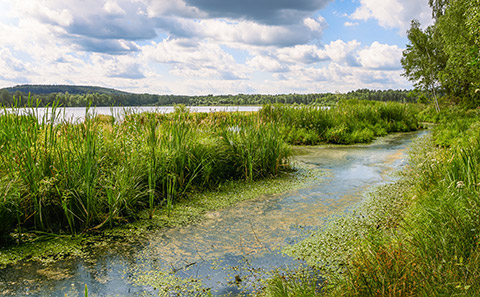New projects launched to help tackle water pollution

The University of Southampton is undertaking two engineering projects to develop new technologies to more effectively monitor pollution in our rivers, lakes and reservoirs.
The Natural Environment Research Council (NERC) has awarded projects led by Southampton researchers a total of £900,000 to design, build and test devices which can radically improve our ability to measure water pollutants.
The funding is part of a £12 million investment by NERC and Defra into 13 projects nationwide to help assess the state of UK waterways, habitats, soil and air. These will draw on UK science developments to deliver new sensing systems and monitoring approaches, focussing on:
- Biodiversity and invasive species
- Water quality
- Soil health
- Greenhouse gas emissions, particularly methane
Concentrating on water quality, the University of Southampton research is split into two areas.
One (Adaptive multi-nutrient monitoring system), led by Professor Xize Niu – in collaboration with the Centre for Ecology and Hydrology (CEH) – will develop a low-cost sensor which can monitor multiple nutrients in freshwater for extended periods, providing near real time data. The device could be used in places such as rivers and lakes, wastewater plants and fish farms.
Professor Niu says: “Current instruments for this kind of monitoring are expensive to buy and run. They can be unreliable and generally aren’t capable of tracking more than one nutrient at a time. Our project hopes to change this, and we are excited to collaborate with CEH, Water Utility Companies, Agriculture and Aquaculture and SMEs, to tackle the pollution problems which lead to nutrient enrichment and algal blooms.”
The other (Next generation passive sampling for monitoring organic contaminants in water), led by Dr Adrian Nightingale – in collaboration with Professor Gary Fones of the University of Portsmouth – will create a new kind of sampler for detecting organic chemicals, such as pharmaceuticals, pesticides and industrial products.
Existing sampling techniques are time consuming, expensive and carbon-intensive, problems which Dr Nightingale says they aim to tackle: “We want to develop a sampler which will provide more detailed data, with the potential to be deployed in the water for much longer and take multiple samples.
“Organic contaminants pose a very real risk to both the health of the natural environment and all of us who use it. We aim to deliver new ways to detect them, in a more efficient and effective manner.”
Commenting on the UK awards, Dr Iain Williams, Director of Strategic Partnerships for NERC, said: “This investment by NERC and Defra will help to deliver a step-change in environmental monitoring, modelling and analysis. It supports our ambition to help businesses to grow through the development and commercialisation of new products, processes, and services, supported by an outstanding research and innovation ecosystem.”